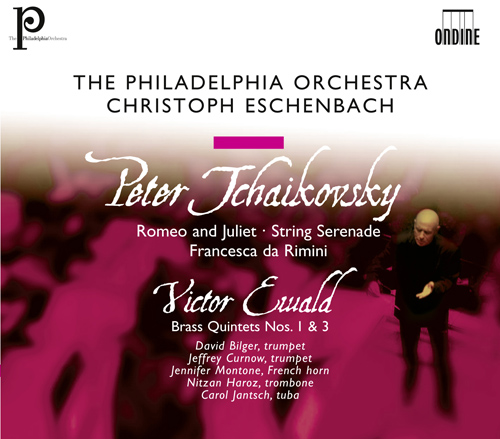Eschenbach’s approach to the Serenade is big and sumptuous…he does hit the heights of the love theme with aristocratic aplomb and he always reminds you what a fabulously organised symphonic movement [Francesca] is.
The Tchaikovsky pieces in this set were recorded live at concerts in November 2007 (the Serenade) and January 2008 (Romeo and Francesca); the Ewald quintets are studio recordings made in June 2009. Only the Serenade is followed by recorded audience applause, however. The recorded sound is ample and clear, if a bit distant (a feature of the acoustics of Verizon Hall itself). For those who have any questions or doubts, the fabled Philadelphia sound in all its lushness is evident in full force, and naturally a major plus when it comes to the Romantic Russian repertoire. Eschenbach’s tempi are consistently on the broad side; e.g., his Romeo clocks in at 22:21 and Francesca at 26:24. By comparison, Yevgeny Svetlanov and Riccardo Muti (my usual benchmarks for Tchaikovsky performances) respectively require only 18:49 and 20:10 for Romeo, and 23:04 and 23:12 for Francesca. In the Serenade, Eschenbach likewise is still the slowest overall at 34:25, but more competitive; Svetlanov takes 33:06, while Muti clocks in at a fleet 30:24.
Do Eschenbach’s performances drag? Fortunately, no; while spacious, they are well proportioned, energetic in faster sections, and languorous in slower ones. The measured opening of the Romeo, for example, points out a relation to Russian Orthodox chant in the Friar Lawrence theme that I had never considered before, but which makes perfect sense in a Russian cultural context. The doomed teenagers’ love theme and the slow movement of the Serenade are luxuriantly unfolded. Eschenbach’s approach, however, is less successful in the Montague-Capulet strife music, and particularly so in the whirlwind sections of Francesca, where Svetlanov’s terrifyingly incendiary maelstrom makes painfully evident a corresponding lack of dramatic tension from the Philadelphians. As for the Serenade, this is an excellent performance...The fillers follow the practice of some previous Ondine Philadelphia Orchestra recordings in showcasing orchestra members in chamber works. Victor Ewald (1860–1935) was a Russian engineer and amateur composer; his four brass quintets, among the earliest pieces penned for that ensemble, are staples of that repertoire. The playing here by the members of the orchestra’s brass section is naturally of a high order...Certainly, this is well worth acquiring.































